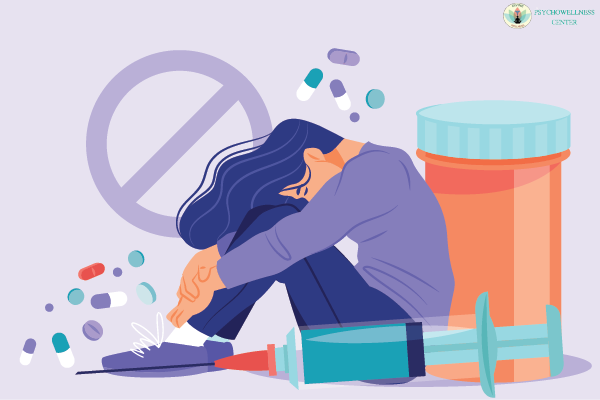Substance-induced psychotic disorder is a type of mental disorder caused by the use of drugs, alcohol, or other substances. It is characterized by symptoms of psychosis, such as hallucinations, delusions, disordered thinking and behavior, and a break from reality. These symptoms may occur during or after substance use and can last for a varying length of time.
The psychology behind substance-induced psychotic disorder is related to the way certain substances affect the brain and alter perception, thinking, and emotions. Some substances, such as alcohol, cannabis, and stimulants, can induce a temporary state of psychosis by altering the levels of neurotransmitters in the brain and disrupting normal brain functioning.
The exact cause of substance-induced psychotic disorder is not well understood, but several factors may contribute to its development, including:
- Genetics: Some people may have a genetic predisposition to develop substance-induced psychotic disorder.
- Dosage: The amount and frequency of substance use can increase the risk of developing a psychotic disorder.
- Substance type: Certain substances, such as cocaine, amphetamines, and hallucinogens, are more likely to cause psychotic symptoms than others.
- Mental health history: People with a history of mental health problems, such as schizophrenia or bipolar disorder, are at a higher risk of developing substance-induced psychotic disorder.
- Environmental factors: Environmental factors, such as stress and trauma, may increase the risk of developing a substance-induced psychotic disorder. The psychology behind substance-induced psychotic disorder is related to the way certain substances affect the brain and alter perception, thinking, and emotions. Some substances, such as alcohol, cannabis, and stimulants, can induce a temporary state of psychosis by altering the levels of neurotransmitters in the brain and disrupting normal brain functioning.
The exact cause of substance-induced psychotic disorder is not well understood, but several factors may contribute to its development, including:
- Genetics: Some people may have a genetic predisposition to develop substance-induced psychotic disorder.
- Dosage: The amount and frequency of substance use can increase the risk of developing a psychotic disorder.
- Substance type: Certain substances, such as cocaine, amphetamines, and hallucinogens, are more likely to cause psychotic symptoms than others.
- Mental health history: People with a history of mental health problems, such as schizophrenia or bipolar disorder, are at a higher risk of developing substance-induced psychotic disorder.
- Environmental factors: Environmental factors, such as stress and trauma, may increase the risk of developing a substance-induced psychotic disorder.
Treatment options for substance-induced psychotic disorder include:
Abstinence: The most effective treatment for substance-induced psychotic disorder is to stop using the substance causing the symptoms. This will typically result in the resolution of psychotic symptoms, although it may take some time for the brain to return to its normal functioning.
Medications: Antipsychotic medications, such as haloperidol and risperidone, can be used to manage the symptoms of psychosis. Antidepressants and mood stabilizers may also be prescribed to manage other symptoms associated with substance-induced psychotic disorder.
Psychotherapy: Psychotherapy can be used to help people with substance-induced psychotic disorder manage their symptoms, understand the underlying causes of their substance use, and develop strategies for avoiding substance use in the future.
Rehabilitation programmes can provide structured support to people with substance-induced psychotic disorder in order to help them overcome their substance misuse problems and improve their general mental health.
Support organizations: such as Alcoholics Anonymous and Narcotics Anonymous, can offer persons with substance-induced psychotic disorder peer support and encouragement as they attempt to overcome their substance misuse problems.
Dual diagnosis treatment: If a person has a substance use disorder and a mental health disorder, dual diagnosis treatment can address both conditions simultaneously and improve the chances of recovery.
It’s important to note that treatment options may vary based on the specific substance used, the severity of symptoms, and the individual’s personal needs and preferences. A mental health specialist can advise you on the best course of action.
Coping with substance-induced psychotic disorder can be challenging, but there are several strategies that may help:
- Seek medical help: Seeking medical help is the first step in managing substance-induced psychotic disorder. A Clinical psychologist or Best psychiatrist in India can help diagnose the condition and develop an effective treatment plan.
- Avoid substance use addiction: Abstaining from substance use is crucial for managing substance-induced psychotic disorder. This can be challenging, but support from family, friends, and an Online counselor or rehabilitation psychologist can help.
- Engage in self-care: Taking care of oneself, including getting enough sleep, eating a healthy diet, and engaging in regular exercise, can help improve overall mental health and manage symptoms of substance-induced psychotic disorder. With the help of a good or Best psychologist delhi, you can plan a schedule.
- Practice stress-management techniques: Stress can trigger symptoms of substance-induced psychotic disorder, so it’s important to engage in stress-management techniques, such as mindfulness, deep breathing, and progressive muscle relaxation.
- Connect with support networks: Joining a support group for people with substance use disorders or a group for people with mental health problems can provide a supportive community and help manage symptoms of substance-induced psychotic disorder.
- Maintain a routine: Maintaining a regular routine, including a consistent sleep schedule and regular exercise, can help stabilize mood and manage symptoms.
- Seek professional help: Psychotherapy can help individuals with substance-induced psychotic disorder work through their emotions, develop coping skills, and improve their overall mental health.
It’s important to remember that recovery from substance-induced psychotic disorder takes time and requires a comprehensive, individualized approach. However, with the right support and resources, it is possible to manage symptoms and achieve a fulfilling life.
For mental health therapy, you may also make an appointment with well-known, knowledgeable psychologists at the Psychowellness Centre,which has sites in and around Delhi NCR, NOIDA, Faridabad, Janakpuri, Dwarka, and Vasant Vihar.
Contribution: Dr (Prof) R K Suri, Clinical Psychologist, life coach & mentor TalktoAngel & Ms Aditi Bhardwaj Psychologis

